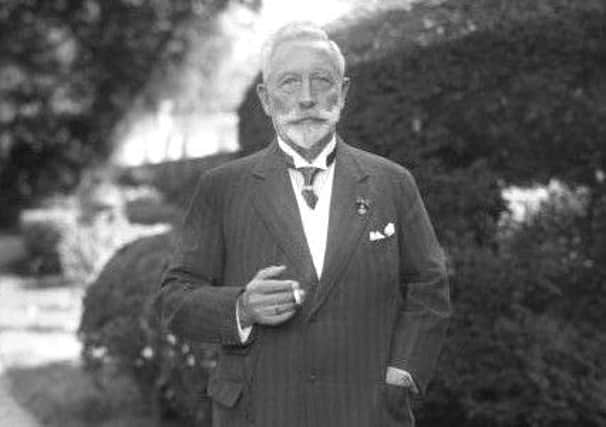Exiled Kaiser Wilhelm II lived the life of a country gentleman at Doorn


On 3 October 1918, the Germans asked for an armistice on the basis of President Wilson’s Fourteen Points.
Wilson made it clear that he regarded the Kaiser as an obstacle to peace and that he would only deal with a democratic Germany but, apart from the Independent Socialists (the USPD) and the Spartacists (the radical socialists led by Rosa Luxemburg and Karl Liebknecht), there was no great clamour within Germany for a republic.
Advertisement
Hide AdAdvertisement
Hide AdIt took more than a month for the terms of the armistice to be agreed.
Ludendorff, Quartermaster-General of the German Army, was insistent that there must be a new government in Germany to take responsibility for the armistice so as to leave the army with the unsullied reputation that it had not been defeated but rather ‘stabbed in the back’ by civilian politicians.
Ludendorff advised the Kaiser ‘to bring those circles into government (meaning the Liberals and the Socialists) to whom we mainly owe it that we are in this position. They are now to make the peace which must now be made. They shall now eat the soup they have brewed for us.’
A new government was formed by Prince Max von Baden, a liberal, and he included two members of the SPD in the new administration.
Advertisement
Hide AdAdvertisement
Hide AdAs heir presumptive to the grand ducal throne of Baden, Max was a monarchist, as was Friedrich Ebert, the SPD leader, who at this stage feared regime change would produce chaos and revolution.
The Kaiser went to army HQ, expecting support but was told: ‘The army will march home in good order under its leaders and commanding generals, but not at the order of Your Majesty.’
Groener, Ludendorff’s successor, summed up the mood of the army thus: ‘The troops don’t have anything against the Kaiser; he is actually quite without interest to them; they have only one wish, to go home as soon as possible.’ The Kaiser’s life-long love affair with the army remained unrequited to the end.
On 10 November the Kaiser left for the Netherlands, which had been neutral throughout the war, by special train.
Advertisement
Hide AdAdvertisement
Hide AdFearing that parts of the railway line were controlled by ‘revolutionaries’, the Kaiser and his entourage made the final stages of the journey in a convoy of cars.
The previous day Prince Max resigned as head of the government and was replaced by Ebert.
Against the backdrop of sailors mutinying at Kiel, widespread strikes and outbreaks of disorder, the SPD had already concluded that the Kaiser’s abdication was the only way to obtain peace and stave off social revolution.
In Ebert’s words: ‘If the Kaiser does not abdicate, social revolution is inevitable. I do not want it; I hate it like sin.’
Advertisement
Hide AdAdvertisement
Hide AdEbert wished to organise a constituent assembly before declaring a republic but to pre-empt Karl Liebknecht’s proclamation of a ‘free socialist Republic’, Philipp Scheidemann, Ebert’s SPD colleague, interrupted his lunch to proclaim a republic to the crowds assembled outside the Reichstag.
With the benefit of hindsight, it is possible to speculate that constitutional monarchy might have provided Germany with a much more stable future than the Weimar republic.
When Auguste Viktoria, the Kaiserin, died in 1921 she had indicated her desire to be buried in the royal mausoleum at Potsdam. The German authorities agreed.
As the funeral cortege travelled by night across northern Germany mourners turned out in huge numbers to watch it pass, making ‘an unbroken human chain’ across the country.
Advertisement
Hide AdAdvertisement
Hide AdIn Berlin 200,000 people attended the funeral, evidence of the deep support which still existed for the monarchy.
In the Netherlands the Kaiser was the guest of Count Bentinck, a Dutch aristocrat. The Kaiser’s first request was for a really good cup of English tea.
The Treaty of Versailles provided for the prosecution of the Kaiser ‘for a supreme offence against international morality and the sanctity of treaties’ but the Dutch refused all requests for his extradition.
The Kaiser purchased (from the grandmother of Audrey Hepburn) a manor house in the municipality of Doorn , known as Huis Doorn, and moved there in May 1920.
Advertisement
Hide AdAdvertisement
Hide AdIn exile he lived the life of a country gentleman. He wrote a slim memoir, indulged his interest in archaeology and chopped down trees by way of exercise.
Lacking critical self-awareness, he exhibited absolutely no remorse for the war or his role in events leading up to it. He blamed everybody indiscriminately for his plight, railing against the Jesuits, Freemasons (especially ‘the machinations of the Grand Lodge of the Orient’) and the Jews.
In the early 1930s he briefly entertained hopes that the Nazis might restore the Monarchy but Hitler, whom he regarded as vulgar, viewed the Kaiser with contempt and by 1934 had demonstrated that he had no interest in restoring the Monarchy by breaking up celebrations marking the Kaiser’s 75th birthday.
A few days later Hitler proscribed all monarchist organisations. The Kaiser still retained a sneaking regard for the Nazis’ aspirations to restore Germany’s greatness.
Advertisement
Hide AdAdvertisement
Hide AdDespite his occasional anti-Jewish sentiments, he was genuinely appalled by the events of Kristallnacht and said that for the first time he was ashamed to be a German. Although he welcomed Hitler’s early triumphs during the Second World War, he correctly anticipated: ‘It will run away with him, as it ran away with me.’
He did not live quite long enough to see his assessment vindicated. He died at Doorn on 4 June 1941, less than three weeks before Hitler’s invasion of the Soviet Union, and was buried in a mausoleum in the grounds.
In June every year hundreds of German monarchists visit the House to lay wreaths and pay their respects to the last Kaiser.